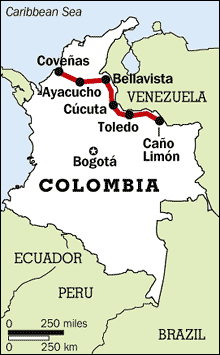US focus in Colombia expands from drugs to oil
www.csmonitor.com from the February 05, 2003 edition
American troops arrived recently to train local soldiers in how to guard pipelines.

By Rachel Van Dongen | Special to The Christian Science Monitor BOGOTÁ, COLOMBIA – In a sign of how important protecting oil has become to the US, 70 Army Green Berets are training Colombian soldiers how to guard a 500-mile stretch of oil pipeline in a lawless portion of the country.
Every drop of oil has taken on new significance for Washington as uncertainty grows in the petroleum-rich Middle East, and a two-month strike in neighboring Venezuela has slowed exports from there.
That means more attention on relatively small producers like Colombia, where the oil potential ranks behind Mexico, Venezuela, and even Brazil, analysts say.
"It's not so much that Colombia is a large oil supplier, or that it is the most important oil supplier," says Amy Jaffe, a senior energy analyst at the James A. Baker Center for Public Policy at Rice University. "It's really more a timing issue."
But US priorities in Colombia, the 10th-largest oil supplier to the US, have been shifting for some time. American troops are now authorized to train Colombian troops to fight rebels rather than just intercept drugs.
Six months ago, Congress authorized $98 million for equipment and troops to help protect the pipeline from guerrilla attacks.
Guarding Caño-Limón is the first step in this new policy, which was designed to help protect infrastructure such as roads and electrical towers from rebel attacks.
Oil "is an increasing priority" in Colombia, says Adam Isacson, an analyst at the Washington-based Center for International Policy, which supports demilitarization of the Colombian conflict. "It could even make the difference in [stabilizing] the price of oil," he says.
But first, the political situation must be stabilized in the violence-ridden state of Arauca, where the majority of rebel attacks against the pipeline occur. Arauca has seen four car bombs, the murder of 30 people, and the kidnapping of two Western journalists - who were released last week - since the start of 2003.
The mouth of the Caño-Limón complex sits in the middle of the dusty road between Saravena and Arauca City in northeastern Colombia, just six miles from the Venezuelan border.
In 2001, the Revolutionary Armed Forces of Colombia (FARC) and the National Liberation Army (ELN) bombed the pipeline 170 times, stalling production for seven months and causing a loss of $500 million to the Colombian government. In 2002, as Colombian protection grew, rebel attacks decreased, but it is still a prime target.
Occidental Petroleum spokes- man Larry Meriage, calls the arrival of US troops "reassuring." He points to a December explosion outside the Caño-Limón complex that killed two and wounded 11 Colombian Occidental security contractors.
Mr. Meriage says Occidental, which owns a large stake in the Caño-Limón pipeline, is exploring other opportunities in Colombia's upper Magdalena Valley and the central Llanos basin.
Security will come from 70 members of the 7th Special Forces Group based at Fort Bragg, N.C. who arrived in Colombia two weeks ago to train local troops. A US official, who requested anonymity, said he was unaware of any other military unit directly deployed to help protect an oil pipeline.
The American troops will train about 450 Colombian men for eight to 10 weeks in basic infantry skills, intelligence, and rapid- response to rebel threats.
Of the $88 million that is certain to be used for what is known as the "infrastructure security program," US officials said $71 million would be provided for badly needed helicopters - the pipeline brigade currently has none - and $17 million for actual training programs.
The same official said that once training of a battalion had been completed, another Special-Forces unit would move in and begin schooling a second Colombian unit. The goal is to train about 900 Colombian soldiers by the end of 2003.
Colombian troops have a pragmatic view of the American presence. "The United States is interested in oil the same way it interests any other country in the world," says Maj. Julio Burgos of the 18th Brigade. "There is a US company that has its interests in this country. The US is defending its interests."
Analysts say maintaining the flow in Colombia contributes to political stability in the region. Michelle Foss, an energy specialist at the University of Houston, suggests that American involvement in protecting the pipeline had to do with geopolitical interests in South and Central America, which depend more heavily on Colombian oil.